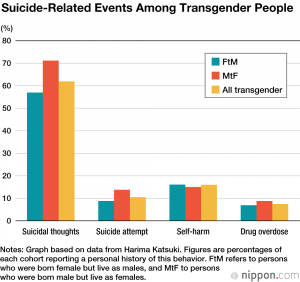Temps de lecture : 8 minutes
References
| ↑1 | NBC News, Japan’s Surpeme Court upholds transgender sterilization requirement, January 2019, available at: https://www.nbcnews.com/feature/nbc-out/japan-s-supreme-court-upholds-transgender-sterilization-requirement-n962721 |
|---|---|
| ↑2 | « personal feeling that there is a gap between : the gender which assigned by the doctors at the birth, the way that the person is perceived by the society in terms of gender and the perception of its own identity. Those gap can provoke a dissociation with our own perception (…) it is what we call dysphoria of gender.”, definition available on : https://wikitrans.co/2018/01/19/quest-ce-quune-transition/ |
| ↑3 | Government of Japan : https://elaws.e-gov.go.jp/search/elawsSearch/elaws_search/lsg0500/detail?lawId=415AC1000000111 |
| ↑4 | Manager of the clinic, certificate from the University of Tokyo, manager of the Japan Society of Sexual Science, member of the World Professionnal Association for Transgender Health |
| ↑5 | HARIMA Katsuki, Things to know about the LGBT Community, Nippon.com, March 2019, available on : https://www.nippon.com/en/japan-topics/c05903/things-to-know-about-the-lgbt-community.html |
| ↑6 | National Police Agency : https://www.npa.go.jp/safetylife/seianki/jisatsu/R02/R01_jisatuno_joukyou.pdf |
| ↑7 | OSHIMA Ayami, セクシュアルマイノリティの就労問題―当事者が安心して働くために―,Waseda University, 2019, available on : http://www.f.waseda.jp/k_okabe/semi-theses/1904ayami_OSHIMA.pdf |
| ↑8 | LGBT法連合会, List of difficulties encountered by people belonging to the LGBT community, March 2019, available on : http://lgbtetc.jp/#sec04 |
| ↑9 | MIZUTANI Hideo, トランスジェンダー(以下「TG」と略す。「性同一性障害」など)の人々は、職場などで様々 |
| ↑10 | な差別やハラスメントを受けているようですが、どのようなものでしょう。どうしたらよいでしょうか?, CuoreC³, available at : https://www.cuorec3.co.jp/info/thinks/mizutani_02_05.html |
| ↑11 | Philippe Mesmer, In Japan, the LGBT community goes into action against the « hatred speech » of a deputize, Le Monde, July 2018, available on : https://www.lemonde.fr/asie-pacifique/article/2018/07/30/au-japon-la-communaute-lgbt-se-mobilise-contre-le-discours-de-haine-d-une-deputee_5337375_3216.html |
| ↑12 | Government of Japan : https://elaws.egov.go.jp/search/elawsSearch/elaws_search/lsg0500/detail?lawId=415AC1000000111 |
| ↑13 | MITSUHASHI Junko,How does Shinjunku became the center of sexual diversity in Tokyo, July 2020, Nippon.com, available on : https://www.nippon.com/fr/japan-topics/c05902/ |
| ↑14 | https://www.facebook.com/groups/stonewalljapan |
| ↑15 | Nippon.com, LBGT in the Japanese society : towards a progressive acceptation, November 2018, available on : https://www.nippon.com/fr/features/h00288/?cx_recs_click=true |
| ↑16 | https://corp.shiseido.com/en/sustainability/labor/diversity.html |
| ↑17 | Sebastien Thibert, In a region of Japan, the “outing” of LGBT is from now on punished by the law, June 2020, Fugues, available on : https://www.fugues.com/256583-article-dans-une-region-du-japon-le-outing-des-lgbt-est-desormais-puni-par-la-loi.html |
| ↑18 | Prefecture of Ibaraki : https://www.pref.ibaraki.jp/hokenfukushi/fukushi/jinken/ibarakipartner.html |
| ↑19, ↑24 | Ibid 9 |
| ↑20 | http://g-pit.com/ |
| ↑21 | https://jobrainbow.jp/corp/company |
| ↑22 | http://lgbtetc.jp/ |
| ↑23 | MINNA Subaru, LGBTの割合は13人に1人? 100人に1人? バラつく理由, November 2019, JobRainbow Magazine, available on : https://jobrainbow.jp/magazine/lgbt-percentage |
| ↑25 | M. V. Lee Badgett, The Economic Cost of Stigma and the Exclusion of LGBT People: A Case Study of India, Banque mondiale, October 2014,available on: http://documents1.worldbank.org/curated/en/527261468035379692/pdf/940400WP0Box380usion0of0LGBT0People.pdf |
| ↑26 | Nijiiro Diversity ; Center for Gender Studies, International Christian University Tokyo, niji Voice 2018 ~LGBTも働きやすい職場づくり、生きやすい社会づくりのための「声」集め~, 2018, available on : https://nijiirodiversity.jp/wp1/wp-content/uploads/2019/01/nijiVOICE2018_web.pdf |
| ↑27 | « to feel man being a man from birth, or woman being woman from birth”, definition available on : https://vivre-trans.fr/cisgenre-transgenre-la-difference/ |
| ↑28 | Ibid 20 |
| ↑29 | Hiroyuki Tanaka, More understanding of sexual minorities needed in Japan : Ex-defense minister Inada, August 2018, The Mainichi, available on : https://mainichi.jp/english/articles/20180802/p2a/00m/0na/003000c |

